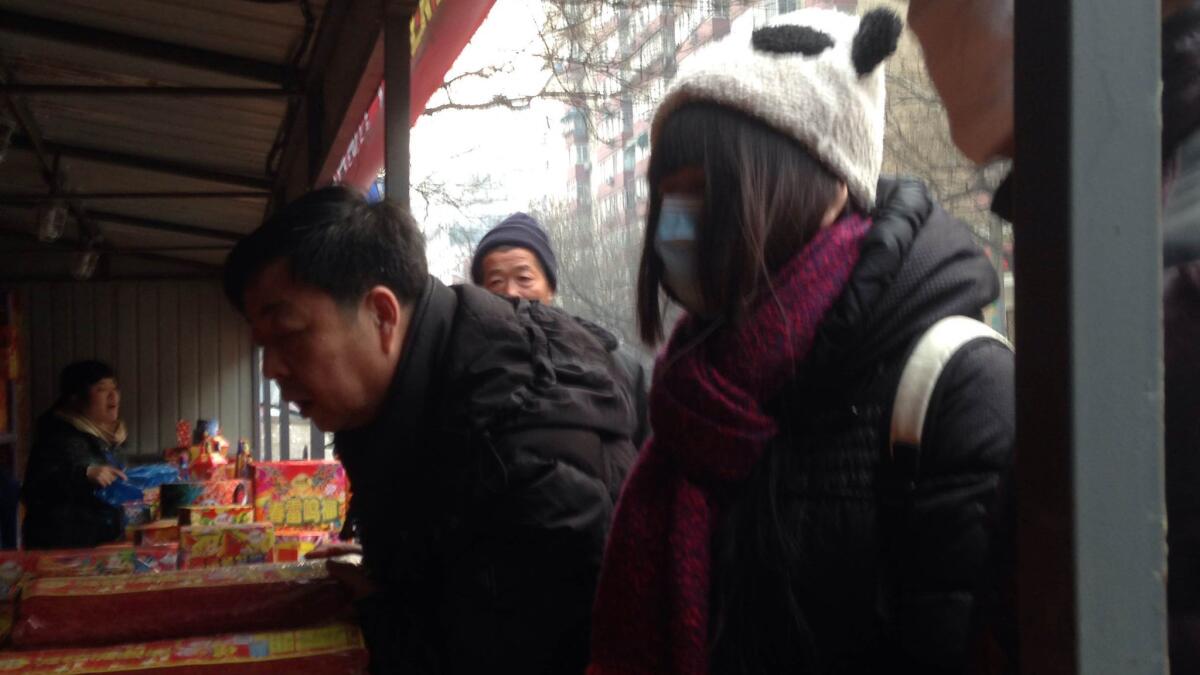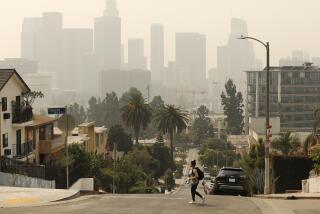China looks to halt New Year’s fireworks to curb air pollution

BEIJING -- Fireworks are as integral to Chinese New Year as pine trees are to Christmas. But with smog blanketing many Chinese cities these days, environmental activists, meteorologists and government officials are urging people to start the new year off without a bang.
Tradition holds that noisy pops and colorful flares ward off evil spirits and bring good luck for the new year. But the pyrotechnics also release particulates including sulfur dioxide and other toxins.
In Beijing two years ago on Chinese New Year’s Eve, levels of tiny particulates known as PM2.5 surged to 1,486 per cubic meter, state-run media reported -- more than 40 times the standard considered safe in the U.S.
China’s official seven-day holiday, welcoming the Year of the Horse, begins Friday.
Starting Thursday, the China Meteorological Assn. will issue a daily four-alert fireworks index tied to smog levels; when the index hits the highest, or red, level, the public will be advised not to light any fireworks, the official Xinhua News Agency said.
[Updated, 9:05 a.m. PST Jan. 29: On Wednesday evening, Beijing’s municipal government sent text messages to many cellphones in the city, urging people to set off fewer fireworks or none at all.]
Several cities have curtailed the number of days that residents are allowed to use fireworks. Chu Xumin, of the environmental group Green Zhejiang in eastern China, noted that the city of Hangzhou has issued a regulation permitting fireworks on only three days during the holiday, down from an 18-day period in 2013. The city also canceled its autumn fireworks festival.
Through its social media networks and via Op-Ed articles in local newspapers, Green Zhejiang has been urging people to curb their use of pyrotechnics. “We want to promote a culture of individual responsibility, of doing little things that can help create better air quality,” Chu said. “So driving less, smoking less, fewer fireworks.”
More and more people are cooperating, Chu believes. “People are very aware of what’s going on,” he said.
A survey by the Shanghai Bureau of Statistics found that 81% of city residents supported a total ban on fireworks and that 85% said they were not buying any this holiday season.
Jia Lin, 26, was shopping at a roadside fireworks stand in central Beijing on Wednesday afternoon. Many of the packages’ labels boasted that they produced “less smoke” -- but warnings on the back cautioned that they pollute the environment.
After perusing the selection -- packages labeled “Happy Panda,” “America’s #1 Tanks” and a set called “I Love the Diaoyu Islands” -- she settled on just a few simple packs of firecrackers.
“We are doing less this year,” Jia said. “When my aunt heard I was going to buy fireworks, she told me, don’t buy too many. ... My friends have been circulating messages on social media for months about this.”
In addition to urging people to cut down on their use of fireworks, Chu’s group is also promoting “e-fireworks” -- electronic devices that go bang like a real pyrotechnic and emit a flash of light, but don’t produce any smoke.
Jia said she’d consider using those if they could be found conveniently. “If access to that was as easy as this stand, I would buy them,” she said.
But a clerk at the stand dismissed the idea that an electronic device could replace the real pop of a Happy Panda or America’s #1 Tanks. “It’s meaningless,” she said. “It’s just like playing a recording.”
The Beijing Consumer Assn. has suggested flowers as another possible alternative to fireworks.
In an editorial, the state-run China Daily newspaper said customs must adapt to the modern, polluted age.
“Some may argue that burning firecrackers is a traditional part of Chinese culture. But culture derives from life and changes with the times,” the paper opined. “Since we have been choking on the smog that at times makes people only yards in front of us almost invisible, it should be common sense that we express our joy and wishes at the new year without coughing and spluttering on the aftereffects of fireworks.”
Twitter: @JulieMakLAT
Nicole Liu in The Times’ Beijing bureau contributed to this report.
More to Read
Start your day right
Sign up for Essential California for news, features and recommendations from the L.A. Times and beyond in your inbox six days a week.
You may occasionally receive promotional content from the Los Angeles Times.







